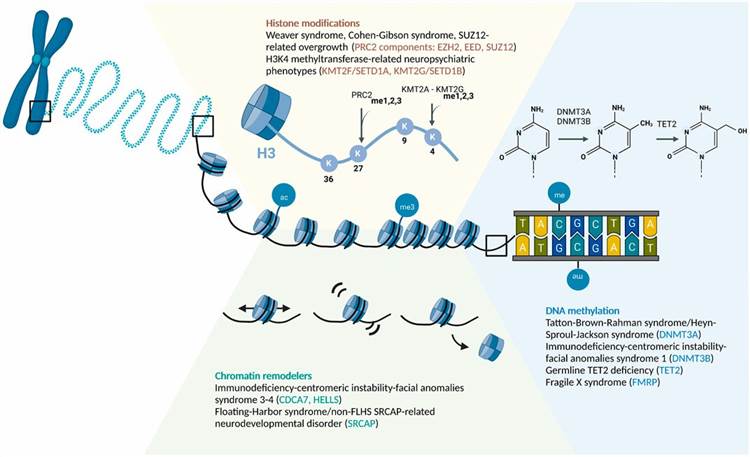Epigenome Analysis Service
Epigenome analysis focuses on the epigenetic modifications on a genome-wide scale of a biological organism, which regulate the gene expression and cellular fate transition without alterations of the underlying DNA sequence. Our company provides a variety of cutting-edge sequencing strategies and in-depth personalized analysis services to help you quickly master the epigenetic information related to rare diseases.
Epigenomics in Rare Diseases
There is growing evidence indicating that, aside from genetic mutations, aberrant epigenetic modifications are emerging as crucial factors in the onset of rare diseases. Different types of epigenetic modifications form inhibitory or activating effects on gene expression, which further affect the overall expression profile and ultimately change the identity and phenotype of the cells. These complicated regulatory networks easily lead to abnormalities of the immune system, nervous system and developmental disorders, which have a great impact on the occurrence and development of rare diseases.
 Fig.1 Schematic of epigenetic regulatory mechanisms associated With rare diseases of epigenetic origins (Fu et al. 2023)
Fig.1 Schematic of epigenetic regulatory mechanisms associated With rare diseases of epigenetic origins (Fu et al. 2023)- Epigenetic Modifications of DNA
The methylation of cytosine is the most common of the three DNA modifications, together with hydroxymethylation and formylation. The level of DNA methylation is maintained or diluted during cell division and differentiation. Once DNA methyltransferases and dioxygenases alter the methylation level of DNA, inducing the aberrant expression of genes and even change the cell fate. As shown in the Angelman syndrome that the loss of differentially methylated regions (DMRs) leads to the abnormal function of UBE3A in brain. - Epigenetic Modifications of Histone
There are numerous types of histone modifications, which synergistically regulate gene expression, chromatin structure and cell function. H3K4me3, H3K27ac, H3K9ac, etc. are activating histone modifications, while H3K9me3, H3K27me3 and H2AK119ub1 are the most studied inhibitory modifications. For example, the abnormal level of H3K27me3 is implicated in the Weaver syndrome, while the level of H3K4me3 has been revealed to be associated with neurological or psychiatric disorders. - Chromatin Structure
Chromatin structure is affected by both histone modifications and DNA methylation to convey the regulation of the gene table with high or low levels of accessibility. Aberrations in chromatin structure can lead to dysregulation of gene expression, contributing to the pathogenesis of various rare diseases. The disruption of chromatin accessibility has been revealed in the mouse model of Kabuki type 1 and 2 and Rubinstein-Taybi type 1 syndromes to trigger alterations in transcriptional profiles.
Our Services
The application of transcriptomic analysis in different methods and dimensions provides novel opportunities for the research and diagnosis of rare diseases. Our company has a full-blown diagnostics development system that provides you with a high-level and high-powered bioinformatics team to support the epigenome analysis for rare disease. Our services include but are not limited to:
DNA Methylation Sequencing and Analysis Service
- Bisulfite-Seq
- RBB-Seq
- TAB-Seq
- MeDIP-Seq
- oxBS-Seq
Histone Modifications Sequencing and Analysis Service
- ChIP-Seq
- ULI N-ChIP-Seq
- CUT & RUN-Seq
- CUT & TAG-Seq
- ACT-Seq
Chromatin Accessibility Sequencing and Analysis Service
- DNase-Seq
- FAIRE-Seq
- ATAC-Seq
- MNase-Seq
Project Workflow
-
 Sample Collection
Sample Collection -
 Epigenomic Library Construction
Epigenomic Library Construction -
 Sequencing
Sequencing -
 Bioinformation Analysis
Bioinformation Analysis -
 Validation & Testing
Validation & Testing
Our Advantages

Multi-faceted comprehensive service

Well-developed criteria for data analysis

Praise and affirmation from plenty clients

Independent R&D patents
Staffed by molecular biology experts and bioinformatics analysis engineers with extensive experience in library buildig and sequencing, our company provides one-stop epigenome analysis services to help you readily analyze the big data related to rare diseases. If you are interested in our epigenome analysis service, please feel free to contact us for more information.
Reference
- Fu MP, et al. Rare diseases of epigenetic origin: Challenges and opportunities. Front Genet, 2023, 14:1113086.
All of our services and products are intended for preclinical research use only and cannot be used to diagnose, treat or manage patients.
